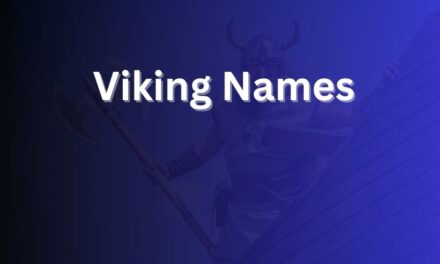In many traditions you encounter powerful names associated with dark forces and ancient evil. These names often reflect fear, chaos, or spiritual rebellion.
You’ll learn about key demon names, their origins, how cultures describe them, and how names shape meaning in myth and modern media, in this article.
What Do Demon Names Represent?
Demon names reflect more than fear. They carry meaning, history, cultural identity, and moral warning. Each name often signals a role — tempter, destroyer, disruptor. Many names derive from ancient languages or religions and have undergone transformation through centuries.
For example, certain demon names once described pagan deities. When those deities fell out of favor, they became evil spirits in new traditions. This transition shows how society reuses names to express spiritual threat.
Understanding these names gives you a window into how human imagination handles evil, power, and moral order. The names also appear in modern books, games, movies, and occult practices, showing their continuing influence.
How Cultures Frame Demon Names
Different cultures offer varying profiles for demon names:
- Abrahamic religions often portray demons as fallen angels or rebellious spirits.
- Near Eastern mythologies assign names to spirits associated with chaos, wind, fertility, or death.
- Asian and Slavic folktales include insurgent spirits or goblin-like beings with specific names.
- Modern horror and pop culture repurpose these old names or invent new ones to convey malevolence.
This variety means demon names don’t follow a single pattern. To make sense of them you must consider origin, role, and how they transformed.
Key Demon Names and Their Origins
Here are some of the most prominent names and their significance:
Lucifer
Originally meaning “light-bearer” in Latin, Lucifer is often portrayed as the fallen angel who defied the divine order. The name gained prominence in Christian tradition as a symbol of pride and rebellion.
Beelzebub
Derived from a Philistine god, the name was adapted in Hebrew tradition as “Baʿal-zəbûb,” meaning “lord of flies.” In Christian demonology Beelzebub became one of the princes of Hell, representing gluttony or idolatry.
Astaroth
A name rooted in the Phoenician goddess Astarte, Astaroth appears in Christian demonology as a male demon. He is depicted as a grand duke of Hell who manipulates truth and temptation.
Azazel
In Jewish tradition this name appears in the wilderness-scapegoat ritual. Over time it evolved in demonological texts to represent a rebellious angel or desert demon associated with impurity and atonement.
Asmodeus
Emerging from Jewish and early Christian legend, Asmodeus is the demon of lust and lechery. He appears in the Book of Tobit, where he opposes a righteous man and brings harm for marital relations.
Each of these names illustrates how meaning, culture, and story converge.
Why So Many Names? Understanding the Multiplicity
You’ll notice that demon names are numerous and often overlapping. Why? A few reasons:
- Regional variations: A demon in one system might go by several names in another language or culture.
- Role-based titles: Many names reflect a function (e.g., tempter, destroyer, liar) rather than only a personal identity.
- Transmission through occult literature: Medieval grimoires and demonology texts list dozens of names—some invented, some adapted.
- Modern pop culture reuse: Movies and games borrow or reinvent names, adding new contexts.
Because of this you’ll often find lists of “190 Demon Names” or over “200 Terrifying Names You’ve Never Heard Of.” The size of these lists underlines the vast imaginative field that names occupy.
Choosing a Name: Meaning and Use
If you sit down to pick a demon name (for a story, game, academic paper), follow these guidelines:
- Origin matters. A name rooted in Hebrew, Latin, or Greek carries different weight than one invented for fiction.
- Associated trait. If the demon represents pride or fire or chaos, select a name historically tied to that trait.
- Cultural sensitivity. Be aware of traditions that treat names as sacred or taboo.
- Modern resonance. Some names sound familiar today (e.g., Lucifer) while others remain obscure and carry fresh horror or novelty.
- Pronunciation and spelling. Names vary widely across sources, so consistent spelling helps your audience.
Using this method you will choose a name that feels authentic and memorable.
Modern Usage of Demon Names
Demon names today show up in many places:
- Games and fiction. Authors and designers use ancient demon names for villains, bosses, or evil forces.
- Occult practices. Some traditions propose that knowing the “true name” of a spirit gives power over it.
- Pop culture references. Television, film, and novels frequently use demon names to evoke fear or charism.
- Art and branding. Even outside horror genres you may find names used for dramatic effect in music, fashion, or performance art.
A 2024 naming resource noted that the name “Lucifer” appeared in baby registries despite its dark connection. This shows how meanings shift over time.
Cautions and Misconceptions
When you deal with demon names, watch for these pitfalls:
- Over-generalization. Not all dark names translate into demons in every culture. Some started as gods, spirits, or mythic beasts.
- Historical accuracy. Many lists mix folklore, myth, religious texts, and modern inventions without distinction.
- Ethical considerations. Using demon names in real rituals or spiritual practices requires knowledge and respect.
- Simplistic assignments. A name’s origin may not equate directly to its modern meaning. For instance, a name linked to fertility may become associated with chaos following cultural change.
By being cautious you ensure your usage is informed and sensitive.
How to Explore Further
Here’s how you can deepen your understanding of demon names:
- Read classical texts on demonology and myth from different regions.
- Compare how a single name appears in Hebrew, Greek, Latin, Arabic, and modern sources.
- Trace the transformation of a deity into a demon in historical context.
- Study how pop culture adapts and sometimes distorts traditional meanings.
- Keep a personal glossary of names, origins, traits, and transformations.
This kind of research reveals patterns and helps you appreciate how names carry power through time.
Why This Topic Still Resonates
You might ask why people still engage with demon names in the 21st century. The answer lies in human psychology. Names help us categorize fear. They provide identity to abstract evil. They allow stories to personify chaos, rebellion, or temptation. In a world where invisible threats abound, naming the dark gives it shape.
Additionally, the interplay between ancient tradition and modern media keeps these names alive. The same name that terrified in medieval exorcisms now features in video games or Netflix shows. The durability of these names speaks to their deep roots in human culture.
Conclusion
Understanding demon names is more than cataloguing scary words. It means recognising cultural shifts, language evolution, and moral patterns.
The names like Lucifer, Beelzebub, Astaroth, Azazel, Asmodeus, among many others, show how humanity assigns narrative to darkness. When you use or study these names you participate in a long tradition of naming and confronting what lies beyond our control.
Frequently Asked Questions
- What qualifies as a demon name?
A demon name typically refers to a supernatural being identified as malignant in myth, religion, or folklore. The name often carries meaning about its role or origin. - Are demon names only from Christian tradition?
No. Many demon names come from ancient Mesopotamian, Greek, Norse, Hindu, Slavic, Islamic, Japanese and other traditions. They span cultures and religions. - Why do some demon names come from former gods?
When old gods lose status in evolving religious systems they may be re-classified as demons. This reflects shifting power, theology, and cultural transformation. - Can I use a demon name for fiction?
Yes. If you’re writing fiction or designing a game you can choose a demon name. Respect origin and meaning if you want authenticity, or invent a new name for creative freedom. - Do all demon names have the same level of power or hierarchy?
No. Demon names vary by tradition. Some are minor spirits, others are major lords or princes of Hell. Each tradition assigns hierarchy differently. - Are demon names ever given to people?
Rarely, but yes. Some names once deemed dark have been adopted by people over time. Modern usage can neutralize or subvert original meaning. - How accurate are lists of demon names online?
Many online lists mix research, myth, folklore and fictional additions. They are useful for inspiration, but you should verify origins and context for academic or serious work.










